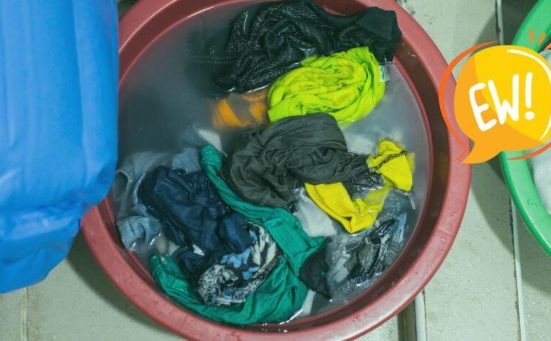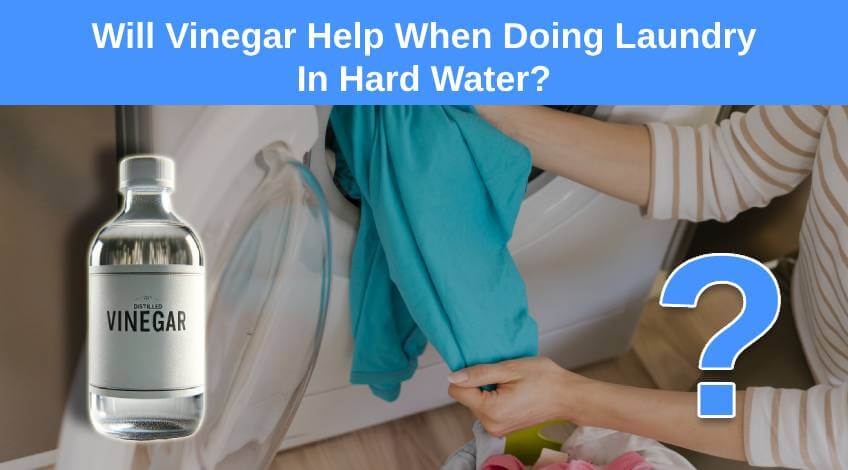
Will Vinegar Help When Doing Laundry In Hard Water?
Struggling with hard water at home? You’re not alone. Hard water is a common problem, especially in certain areas, and it can really mess with your laundry.
But guess what? There’s a super simple and cheap solution that might already be in your kitchen cupboard: vinegar.
Vinegar, especially distilled white vinegar, can naturally make your clothes feel softer. Since hard water can make your fabrics feel stiff, adding vinegar in the rinse cycle will help your laundry come out of the wash feeling soft and comfy.
Let’s have a closer look into how white vinegar can solve your hard water problems in this article!
What Does “Hard Water” Mean?
Hard water is the type of water that contains a high concentration of minerals, like calcium and magnesium. This happens when water travels through the ground, it picks up these minerals in the process, often from rocks.
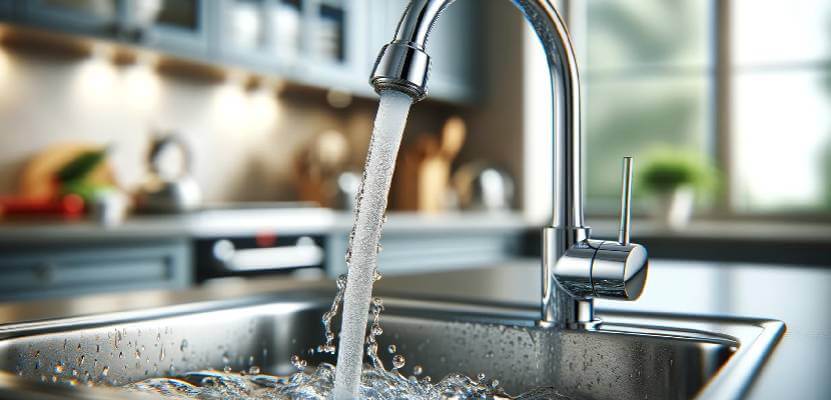
Hard water is often safe to drink, but it’s a different story when it comes to using it to clean, especially when doing your laundry.
Unfortunately, the minerals from hard water can interfere with the effectiveness of your laundry detergent, and the efficiency of your washing machine.
TIP: If you want to confirm whether your area uses hard water, go to this site and enter your postcode.
Why Is Hard Water Bad For Your Laundry?
Yes, we said earlier that hard water is safe for drinking. But what are the exact reasons why it is bad for our laundry sessions?
Here are the main reasons why:
It Reduces The Effectiveness Of Your Detergent
The minerals in hard water can react with laundry detergents, forming a scum that reduces the detergent’s effectiveness. This means you may have to use more detergent to achieve the desired level of cleanliness, which can be costly and is not great if we want to lessen our carbon footprint.
It Makes Your Clothes Dull
As time passes, the mineral deposits from hard water can accumulate on fabrics, leading to a greyish appearance. This is especially noticeable in white fabrics. Hard water can make your clothes look dull and old, even if you were just using them for a few months.
It Makes Your Clothes Stiff
Fabrics washed in hard water often come out feeling stiffer and less comfortable against the skin. This happens because the minerals in the water can form a crust on the fibres of the fabric, making them scratchy and less pleasant to wear.
It Is Tough On Your Fabrics
The combination of mineral deposits and having to use more detergent can increase the wear and tear on fabrics, causing clothes to look worn out and fade faster than they would with soft water.
It Encourages Product Buildup In Your Washer
The reaction between hard water and detergent mixing can leave a residue on both your clothes and the washing machine. This soap scum not only makes fabrics feel rough but can also diminish the efficiency and lifespan of your washing machine.
Is Using Vinegar Good When Doing Laundry In Hard Water?
Distilled white vinegar is one of the wonderful natural products we can use for various household cleaning tasks, especially when doing laundry. But how effective is it when dealing with hard water? The answer to this is very effective.
Vinegar is an acidic substance, which means it can help neutralise the alkalinity of the minerals that are found in hard water. In doing so, it can greatly reduce the negative effects hard water has on your laundry.
- Natural and eco-friendly: Pure Chem's White Vinegar is made from natural ingredients, free from harsh chemicals and additives, and is a safe and eco-friendly alternative to traditional cleaning products.
- Versatile cleaning agent: This vinegar's acidic properties make it a powerful cleaner, cutting through grease, grime, and stains on a variety of surfaces. It can be used to clean floors, tiles, countertops, and even as a natural fabric softener.
When you add white vinegar to your laundry sessions, it will help soften the water, which dissolves the mineral buildup. Also, it will help preserve the colours of your fabrics, prevent detergent buildup, and protect your washer from hard mineral accumulation.
Of course, the benefits will be achieved if you use vinegar correctly.
How to Use Vinegar in Your Laundry
Adding distilled white vinegar to your laundry sessions is simple. It can significantly improve the outcome once you’re done in the wash, especially when dealing with hard water.
Here are the ways you can use white vinegar when doing your laundry:
For Replacing Your Fabric Softener
Although fabric softeners are effective at making clothes feel softer and reducing static cling, they often contain chemicals and fragrances that can be harsh on sensitive skin and the environment. These chemicals can be especially bad when you have hard water, as they will not fully dissolve and will just cling to your fabrics.
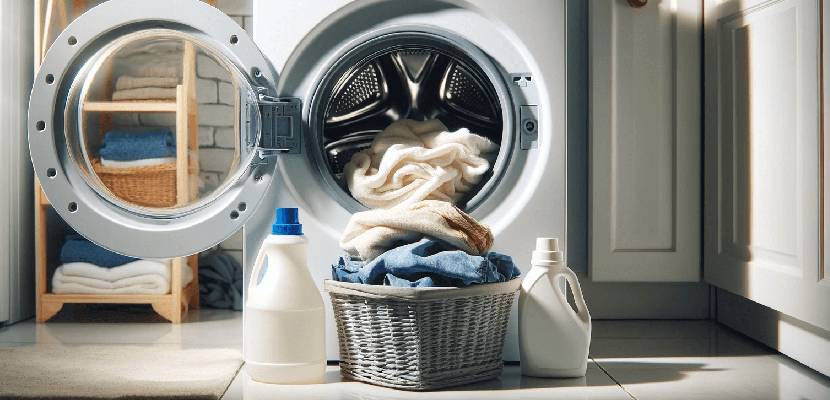
White vinegar, on the other hand, is a natural and gentle alternative. When added to the rinse cycle, vinegar helps to soften fabrics without leaving behind any residue or strong scents.
What To Do:
All you have to do is add half a cup of distilled white vinegar to the fabric softener dispenser before starting your wash. The acidic nature of vinegar also helps to dissolve any detergent or mineral deposits, leaving your clothes feeling soft and fresh.
For Making Your Detergent More Effective
Hard water can hinder the effectiveness of laundry detergents, making them less efficient at cleaning clothes.
Using white vinegar can boost your detergent’s cleaning power by breaking down the minerals in hard water, ensuring that your detergent works more effectively. By doing so, the detergent will be able to clean your clothes properly, ensuring that it will reach each fibre of your fabrics.
What To Do:
Add half a cup of vinegar to the detergent dispenser at the beginning of the wash cycle. This simple step can help your detergent to fully penetrate fabrics, resulting in a cleaner wash.
For Brightening Your Clothes
Over time, clothes can become dull and lose their brightness due to the buildup of detergent residues and hard water minerals.
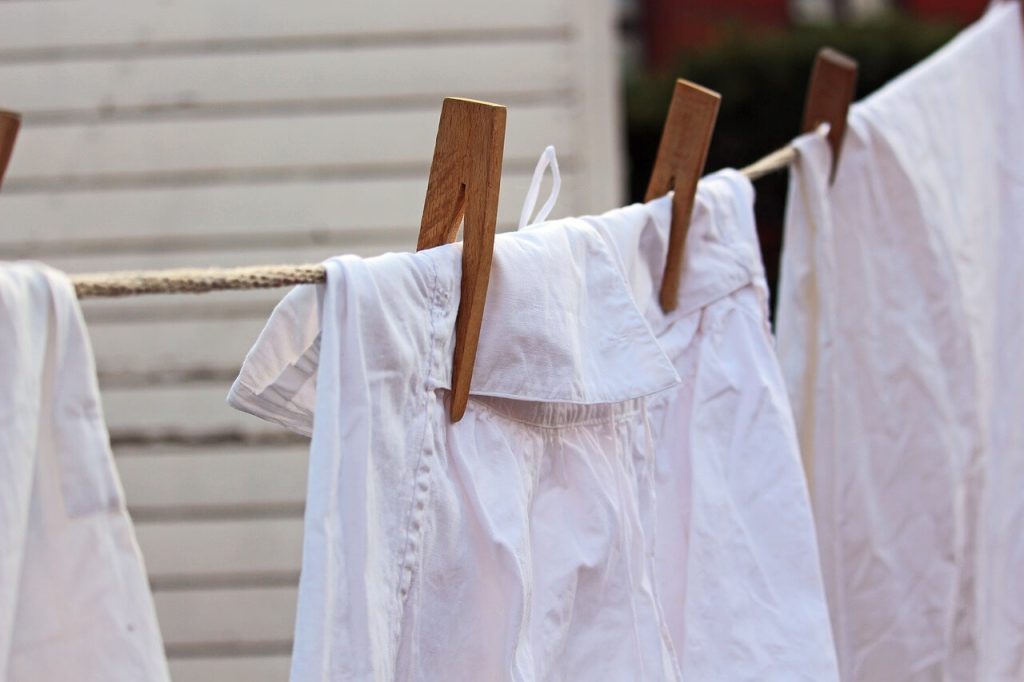
White vinegar can act as a brightener for your fabrics as its acidity will help break down the residues. As a result, it will restore the original brightness of your clothes.
What To Do:
Soak your clothes in a solution of one part vinegar to three parts water for 30 minutes before washing. Alternatively, you can add a cup of vinegar to the wash cycle along with your regular detergent. This method is especially effective for brightening white fabrics and removing yellowing.
For Cleaning Your Washing Machine
Just as vinegar can benefit your clothes, it can also maintain and clean your washing machine.
Over time, washing machines can develop a build-up of detergent residues, fabric softener, and hard water minerals. This build-up can harbour bacteria and produce unpleasant odours.
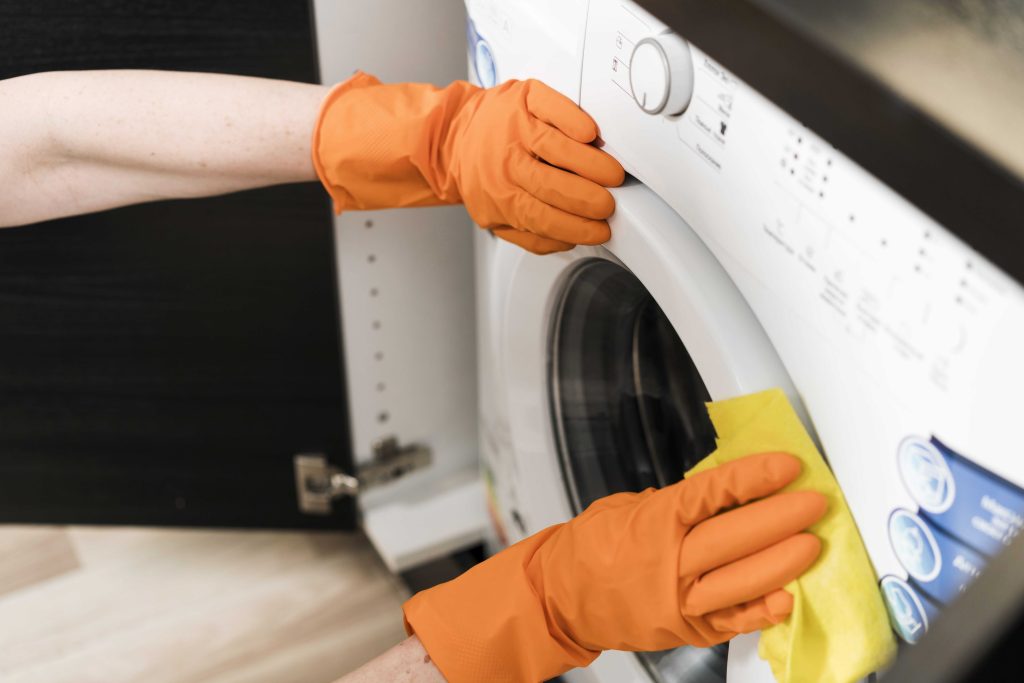
What To Do:
To clean your washing machine, run an empty hot water cycle with two cups of white vinegar. The vinegar helps to dissolve the build-up and deodorise the machine, leaving it fresh and clean.
For best results, it’s recommended to clean your washing machine with vinegar once a month.
WARNING: Vinegar contains acetic acid, which could be a no-no for some washing machine models. Make sure to read the user manual to prevent damage to your appliance.
Make Your Laundry Days More Pleasant!
Yes, it is challenging to have to do your laundry when the hard water is making it difficult to clean your clothes. Thankfully, natural solutions such as vinegar exist, and they will help you protect your clothes, enhance the efficiency of your washing machine, and ensure your laundry is as clean and fresh as possible.
Here are some extra tips to help you:
- Using liquid detergent is better when you have hard water, as powder variants will just make the mineral buildup worse.
- Be cautious when using vinegar on very delicate fabrics, and always test on a small, hidden area first.
- Consider getting a home water softener if your budget allows you. If not, water softening products like Calgon would also help.
- Schedule a regular cleaning session for your washing machine. Running an empty hot cycle with white vinegar once a month will do wonders.
Have questions? Feel free to ask them below!
SEE ALSO: Is Hard Water Bad For The Washing Machine?
Frequently Asked Questions
Yes, vinegar does help with hard water laundry. Vinegar, particularly distilled white vinegar, acts as a natural softener by neutralising the alkalinity of hard water minerals. This reduces the mineral buildup, making your clothes feel softer and preserving the efficiency of your washing machine.
The difference between hard water and soft water primarily lies in their mineral content. Hard water contains a high concentration of minerals, like calcium and magnesium, which it picks up as it moves through the ground. Soft water, on the other hand, has a lower concentration of these minerals. This makes soft water better for cleaning and laundering, as it doesn’t leave mineral deposits behind.
You can know if your water is hard by checking for signs like mineral buildup on taps, reduced efficiency of soap and detergents, and feeling a filmy residue on your skin after washing. A more precise way to determine water hardness is by using a water testing kit or checking the water quality report for your area by entering your postcode on the Aqua Cure website.
When dealing with hard water, it’s advisable to use liquid laundry detergents specifically designed for hard water conditions. These detergents are formulated to be more effective in mineral-rich water, helping to clean clothes thoroughly without leaving residues or requiring excessive amounts.
Yes, hard water can damage the washing machine over time. The minerals in hard water can accumulate in the machine, leading to soap scum buildup and potentially harming its internal components. This reduces the efficiency and lifespan of the washing machine, leading to the need for regular cleaning to deal with these effects.
Also, follow us on Pinterest ...


